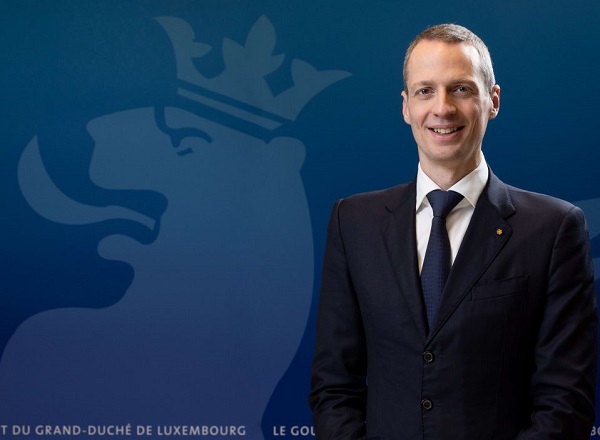 Serge Wilmes, Luxembourg's Minister of the Environment, Climate and Biodiversity and Minister for the Civil Service;
Credit: © SIP / Claude Piscitelli
Serge Wilmes, Luxembourg's Minister of the Environment, Climate and Biodiversity and Minister for the Civil Service;
Credit: © SIP / Claude Piscitelli
On Tuesday 21 October 2025, Luxembourg Minister of the Environment, Climate and Biodiversity, Serge Wilmes, participated in the meeting of the EU Environment Council, in Luxembourg.
According to the Ministry of the Environment, Climate and Biodiversity, the agenda for the meeting included discussions and decisions on preparations for the 30th United Nations Climate Change Conference (COP 30), the European strategy for water resilience and an exchange of views on the European Ocean Pact.
The ministry noted that, for the first item, EU Environment Ministers adopted conclusions on preparations for COP 30, which will take place in Belém, Brazil, from Monday 10 to Friday 21 November 2025. The ministry said that these conclusions will serve as the EU’s general negotiating position at COP 30. To complete this mandate, adoption of the EU climate target for 2040 and the update of the EU’s Nationally Determined Contribution (NDC) under the Paris Agreement, which will define the EU’s 2035 climate ambition, is on the agenda for an additional Environment Council on 4 November 2025.
In his statement, Minister Wilmes expressed regret that it was not yet possible to reference the EU’s long-awaited NDC in these conclusions. He said: “In the current context, it is essential that the European Union demonstrates leadership in climate and environmental matters, one of the few areas where the Union continues to be perceived as a leader. To assume this role, Europe needs credibility and legitimacy. This means listening to science, which is clear on the 2040 target. I take this opportunity to reiterate that it is essential for Luxembourg that the two dossiers – the Nationally Determined Contribution and the 2040 target – remain closely linked.”
The minister also emphasised the importance of securing support from vulnerable countries, the African group and least-developed countries, who broadly share the same objectives.
In relation to the council’s Water Resilience Strategy, ministers subsequently approved conclusions on the European strategy for water resilience. Minister Wilmes stressed: “The responsibility for achieving good status cannot rest solely on the water sector. It is crucial that all relevant sectors – health, economy, industry and agriculture, to name a few – assume their roles and responsibilities. Water resilience must become a cross-cutting component of public policies, including financing and competitiveness.”
He added: “We need a coherent European approach to achieve good status for all water bodies. The problem of PFAS, and particularly TFA, cannot be solved solely at national level. A source-level solution is indispensable.”
The Ministry of the Environment, Climate and Biodiversity stated that Luxembourg will implement a national water strategy. In addition, the ministry will launch broad and ongoing dialogue with stakeholders as part of developing the fourth management plan under the Water Framework Directive. In November, a national round table, “Renaturéierungs-Dësch” (“Round Table on Renaturation”), will accelerate the delivery of watercourse renaturation projects. Luxembourg will also actively engage in structured dialogues with the European Commission.
During discussions on ocean governance, Luxembourg reaffirmed its commitment to protecting the oceans, which are essential to climate regulation and global food security. Luxembourg supports an integrated “source to sea” approach to tackle marine pollution, which often originates on land.
In relation to the implementation of this anti-deforestation instrument, Luxembourg highlighted the importance of resolving IT problems to avoid unnecessary administrative burdens. Luxembourg also advocated for simplifying the regulation, particularly for small producers operating in areas not affected by deforestation. To this end, Luxembourg proposed a two-step approach: postponing the application of the regulation until the technical issues are resolved, followed by an in-depth analysis of simplification options.
Recognising the urgency of the climate crisis and the climate-biodiversity-economy nexus, Luxembourg reaffirmed its support for this instrument. It is seen as essential not only for protecting European consumers against greenwashing, but also for safeguarding the competitiveness of domestic producers against imports that do not meet the same standards. While Luxembourg supports administrative simplification, it firmly opposes any deregulation or repeal of the regulation, calling instead for efficient implementation tailored to small producers’ needs.
During discussions on the 2028 Multiannual Financial Framework (MFF), Minister Wilmes expressed disappointment over the proposed discontinuation of the LIFE programme, which is recognised for delivering concrete results on environmental, climate and biodiversity protection. LIFE remains a key tool for EU environmental policies under the current MFF. The minister insisted on the need to continue LIFE activities, even without its current format, and underlined the importance of integrating clear environmental objectives, with monitoring mechanisms and criteria, into all financial instruments.
Moreover, during an exchange on the forthcoming revision of EU chemicals legislation, Minister Wilmes stressed that protecting human health and the environment must remain central to the reform. Luxembourg considers that this revision should not be limited to technical simplification. It should represent a genuine modernisation of the regulatory framework to make it more effective, coherent and responsive to today’s challenges.
The ministry noted that an additional meeting of the EU Environment Council will take place on Tuesday 4 November 2025.








